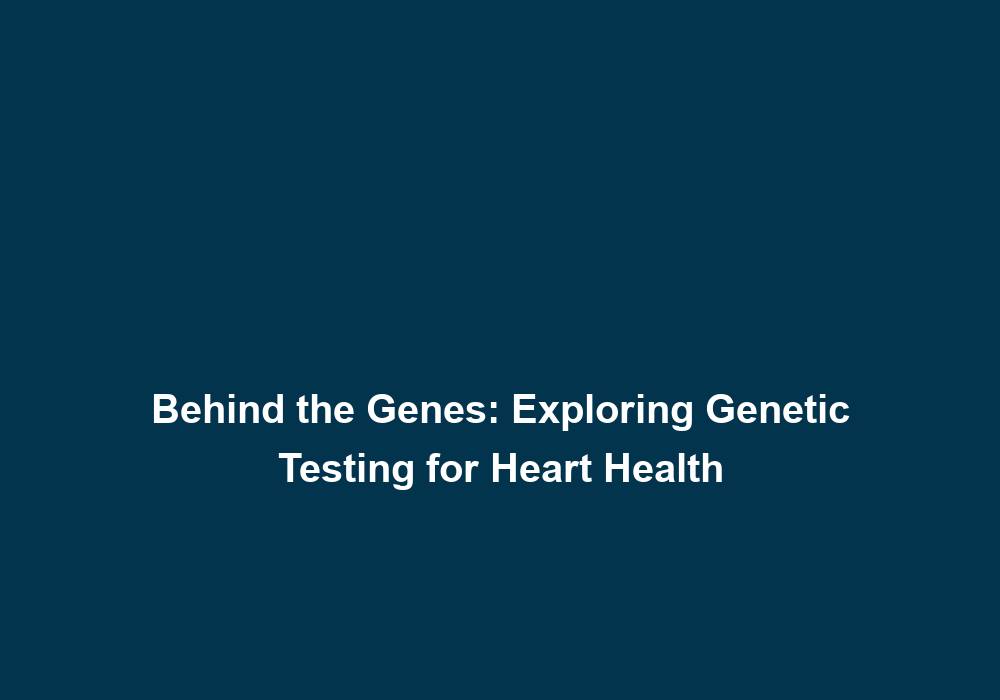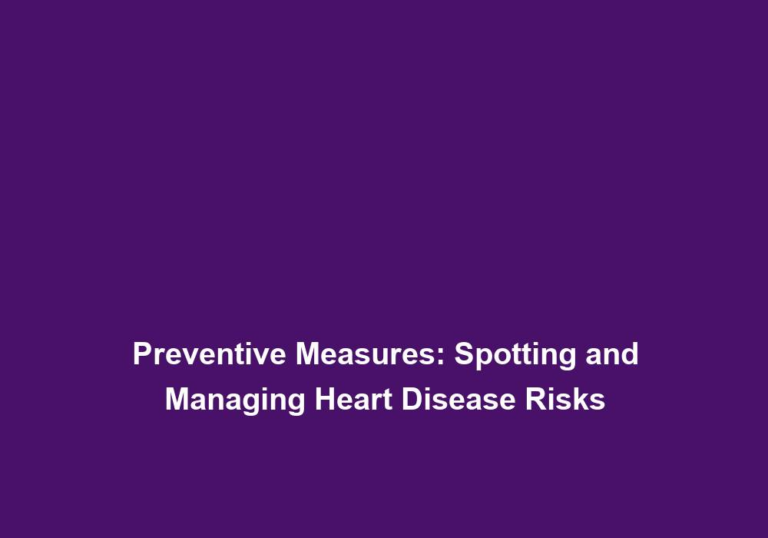Behind the Genes: Exploring Genetic Testing for Heart Health
Genetic testing has emerged as a powerful tool in the field of medical research and diagnostics. By studying an individual’s genetic makeup, scientists and healthcare professionals can gain valuable insights into their susceptibility to various health conditions, including heart disease. In this article, we will delve into the fascinating world of genetic testing for heart health, exploring its benefits, limitations, and the implications it holds for individuals and their families.
Understanding Genetic Testing
Genetic testing, also referred to as DNA testing, involves analyzing an individual’s DNA to identify specific variations or mutations in genes that may indicate an increased risk of developing certain health conditions, including heart disease. By identifying these genetic markers, healthcare professionals can offer personalized guidance and interventions to mitigate the risks associated with cardiovascular health.
Genetic testing provides a comprehensive understanding of an individual’s genetic predisposition to heart disease. It helps identify specific gene variations or mutations that may increase the risk of developing heart conditions. By analyzing an individual’s DNA, healthcare professionals can gain insights into their unique genetic makeup and assess their susceptibility to cardiovascular diseases. This information enables early detection and intervention, allowing for tailored preventive measures and lifestyle modifications to effectively manage the risk.
Genetic testing allows healthcare professionals to delve deeper into an individual’s genetic profile and identify potential genetic markers associated with heart disease. By understanding these genetic variations, tailored treatment plans can be developed to optimize their effectiveness. This precision medicine approach ensures that interventions are targeted towards the individual’s specific genetic makeup, reducing potential side effects and improving treatment outcomes. By personalizing treatment options, genetic testing offers a more precise and effective approach to managing heart health.
Genetic testing not only provides insights into an individual’s own genetic predisposition to heart disease but also sheds light on the hereditary nature of certain heart conditions. By understanding inheritance patterns, individuals and families can make informed decisions regarding family planning and take necessary precautions. Genetic testing can identify genetic variations that can be passed down through generations, enabling families to better understand their risk and make informed choices about their reproductive health. This knowledge empowers individuals and families to proactively manage their heart health and make decisions that can positively impact future generations.
The Process of Genetic Testing
- Consultation: The process begins with a consultation with a healthcare professional who specializes in genetic counseling. This expert will guide individuals through the entire process, explaining the benefits, limitations, and potential implications of genetic testing.
During the consultation, the healthcare professional will discuss the individual’s medical and family history to determine the relevance of genetic testing. They will explain the benefits of genetic testing, such as early detection and personalized treatment options, as well as the limitations and potential implications, both medically and emotionally. The healthcare professional will address any concerns or questions the individual may have, ensuring they have a clear understanding of the process and its implications.
- Sample Collection: To perform the genetic test, a small sample of the individual’s DNA is required. This can be obtained through various methods, such as a simple saliva or blood sample.
Sample collection is a quick and painless process. The individual may be asked to provide a saliva sample by spitting into a collection tube or a blood sample through a finger prick or venous blood draw. These samples contain the individual’s DNA, which will be analyzed in the laboratory to identify any genetic variations or mutations associated with heart disease.
- Laboratory Analysis: The collected DNA sample is sent to a specialized laboratory for analysis. Highly trained technicians and geneticists perform intricate tests to identify any genetic variations or mutations associated with heart disease.
In the laboratory, the DNA sample undergoes a series of complex tests and analysis. Advanced technologies and techniques are employed to identify specific gene variations or mutations that may be linked to heart disease. Highly trained professionals carefully analyze the DNA sample to ensure accurate and reliable results. The laboratory’s expertise and state-of-the-art equipment play a crucial role in the accuracy and reliability of the genetic testing process.
- Result Interpretation: Once the analysis is complete, the results are interpreted by genetic counselors or medical professionals who have expertise in genetics. They explain the findings to the individual and provide guidance on the implications and potential next steps.
After the laboratory analysis, the results are interpreted by genetic counselors or medical professionals with specialized knowledge in genetics. These experts carefully analyze the genetic variations or mutations identified in the individual’s DNA and interpret their significance in relation to heart health. They provide clear and understandable explanations of the results, addressing any concerns or questions the individual may have. The genetic counselors or medical professionals offer guidance on the implications of the results and discuss potential next steps, such as lifestyle modifications, preventive measures, or further medical evaluations.
Limitations of Genetic Testing for Heart Health
While genetic testing holds immense promise, it also has certain limitations that individuals should be aware of:
- Incomplete Understanding: Our knowledge of the genetic basis of heart disease is continually evolving. Thus, genetic testing may not identify all possible gene variants or mutations associated with heart conditions.
It is important to note that genetic testing is based on our current understanding of the genetic basis of heart disease. As research progresses, new gene variants or mutations associated with heart conditions may be discovered. Therefore, it is possible for genetic testing to miss certain gene variants or mutations that are not yet known to be linked to heart disease. Healthcare professionals should communicate this limitation to individuals undergoing genetic testing, ensuring they have realistic expectations regarding the comprehensiveness of the genetic analysis.
- Complex Genetic Interactions: Heart disease is often influenced by a combination of genetic and environmental factors. Genetic testing alone may not provide a complete understanding of an individual’s overall cardiovascular health.
Heart disease is a multifactorial condition, meaning that both genetic and environmental factors contribute to its development. While genetic testing can identify specific gene variations or mutations associated with heart disease, it may not capture the entirety of an individual’s cardiovascular health. Other factors such as lifestyle, diet, exercise, and environmental exposures also play significant roles in heart health. Genetic testing should be considered as part of a comprehensive assessment that takes into account both genetic and environmental factors to provide a holistic understanding of an individual’s cardiovascular health.
- Ethical and Psychological Considerations: Genetic testing can uncover information that individuals may find challenging to process emotionally. It is crucial to consider the potential psychological impact and ensure adequate support is available.
Genetic testing can reveal information about an individual’s genetic predisposition to heart disease, which may have emotional implications. The results of genetic testing can sometimes be difficult to process, raising concerns about future health risks and uncertainties. It is essential for healthcare professionals to provide adequate support and counseling throughout the genetic testing process. They should address any emotional concerns and provide resources for individuals to seek additional support if needed. Open communication and compassionate guidance are crucial in helping individuals navigate the potential psychological impact of genetic testing results.
Genetic Testing and Cardiovascular Disease
Genetic testing has made significant contributions to our understanding of various cardiovascular conditions. Here are a few examples:
- Familial Hypercholesterolemia (FH): FH is an inherited condition characterized by high cholesterol levels and an increased risk of heart disease. Genetic testing can identify mutations in genes associated with FH, enabling early detection and appropriate management.
Genetic testing plays a vital role in identifying individuals with familial hypercholesterolemia (FH), a genetic condition characterized by high cholesterol levels. FH increases the risk of heart disease at an early age. Through genetic testing, specific gene mutations associated with FH can be identified, allowing for early detection and appropriate management. Individuals with FH can receive targeted interventions, such as cholesterol-lowering medications and lifestyle modifications, to mitigate the risk of heart disease and improve long-term cardiovascular health outcomes.
- Long QT Syndrome (LQTS): LQTS is a heart rhythm disorder that can lead to fainting spells and potentially life-threatening arrhythmias. Genetic testing can identify gene mutations associated with LQTS, allowing for timely interventions and preventive measures.
Genetic testing plays a crucial role in the diagnosis and management of Long QT Syndrome (LQTS), a heart rhythm disorder. LQTS can cause life-threatening arrhythmias and fainting spells. Genetic testing can identify specific gene mutations associated with LQTS, enabling timely interventions and preventive measures. Once the gene mutations are identified, healthcare professionals can develop personalized treatment plans, such as medications or implantable devices, to manage the condition and reduce the risk of life-threatening complications.
- Hypertrophic Cardiomyopathy (HCM): HCM is a genetic condition that causes thickening of the heart muscle, leading to various cardiovascular issues. Genetic testing can identify the specific gene mutations linked to HCM, helping individuals and their families understand their risk and make informed decisions.
Genetic testing plays a crucial role in the diagnosis and management of Hypertrophic Cardiomyopathy (HCM), a genetic condition characterized by the thickening of the heart muscle. HCM can lead to various cardiovascular issues, including arrhythmias and heart failure. Genetic testing can identify specific gene mutations associated with HCM, enabling individuals and their families to better understand their risk and make informed decisions about their cardiovascular health. With this information, healthcare professionals can develop personalized management plans, including regular monitoring, lifestyle modifications, and targeted interventions, to optimize heart health and improve long-term outcomes.
The Future of Genetic Testing
As technology continues to advance, so does the potential of genetic testing. Here are a few exciting developments on the horizon:
- Pharmacogenomics: Genetic testing can help determine an individual’s response to specific medications. This information can assist healthcare providers in prescribing the most effective treatment options while minimizing adverse drug reactions.
Pharmacogenomics, a field that combines pharmacology and genetics, holds great promise for optimizing medication selection and dosing. Genetic testing can provide insights into an individual’s genetic variations that may influence their response to specific medications. By understanding an individual’s genetic makeup, healthcare providers can tailor treatment plans accordingly, ensuring the most effective medications are prescribed while minimizing the risk of adverse drug reactions. Pharmacogenomics has the potential to revolutionize medication management and improve treatment outcomes.
- Risk Prediction: With the integration of advanced algorithms and artificial intelligence, genetic testing may soon enable the prediction of an individual’s risk of developing heart disease. This could revolutionize preventive care and allow for targeted interventions even before symptoms manifest.
The integration of advanced algorithms and artificial intelligence in genetic testing holds the promise of predicting an individual’s risk of developing heart disease. By analyzing an individual’s genetic variations in combination with other risk factors, such as lifestyle and environmental exposures, sophisticated algorithms can assess the probability of developing heart disease. This risk prediction capability could revolutionize preventive care by identifying high-risk individuals before symptoms manifest. Targeted interventions, such as lifestyle modifications and preventive medications, can then be implemented to reduce the risk and improve long-term heart health outcomes.
- Precision Medicine: Genetic testing holds the key to personalized medicine. By understanding an individual’s genetic makeup, healthcare providers can tailor treatment plans to maximize their effectiveness and minimize potential side effects.
Genetic testing plays a pivotal role in advancing the field of precision medicine. Precision medicine aims to provide tailored treatment plans based on an individual’s unique genetic makeup. By understanding an individual’s genetic variations, healthcare providers can develop personalized treatment strategies that maximize effectiveness and minimize potential side effects. This approach ensures that interventions are specifically targeted towards the individual’s genetic profile, optimizing treatment outcomes and improving patient experiences. Genetic testing is a cornerstone of precision medicine, enabling healthcare providers to deliver personalized care that is truly tailored to the individual.
In conclusion, genetic testing for heart health offers significant potential in identifying individuals at risk, providing tailored treatment options, and enabling informed decision-making for both individuals and their families. While it has limitations, ongoing advancements in technology and research hold the promise of revolutionizing the field of cardiovascular medicine. By embracing genetic testing, we can pave the way for a healthier future, where preventive care is optimized, and heart disease can be managed more effectively.







